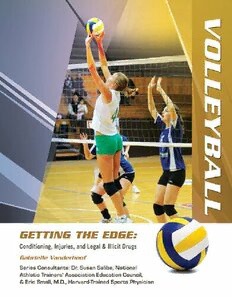
Volleyball PDF
Preview Volleyball
Copyright © 2011 by Mason Crest Publishers. All rights reserved. No part of this publication may be reproduced or transmitted in any form or by any means, electronic or mechanical, including photocopying, recording, taping, or any information storage and retrieval system, without permission from the publisher. MASON CREST PUBLISHERS INC. 370 Reed Road Broomall, Pennsylvania 19008 (866)MCP-BOOK (toll free) www.masoncrest.com First Printing 9 8 7 6 5 4 3 2 1 Library of Congress Cataloging-in-Publication Data Vanderhoof, Gabrielle. Volleyball / by Gabrielle Vanderhoof. p. cm. — (Getting the edge : conditioning, injuries, and legal & illicit drugs) Includes bibliographical references and index. ISBN 978-1-4222-1741-2 ISBN (series) 978-1-4222-1728-3 1. Volleyball—Juvenile literature. 2. Volleyball—Training—Juvenile litera- ture. I. Title. GV1015.34.V36 2011 796.325--dc22 2010016872 Produced by Harding House Publishing Service, Inc. www.hardinghousepages.com Interior Design by MK Bassett-Harvey. Cover Design by Torque Advertising + Design. Printed in the USA by Bang Printing. The creators of this book have made every effort to provide accurate information, but it should not be used as a substitute for the help and services of trained professionals Introduction 6 1. Overview of Volleyball 9 2. Mental Preparation and Safety 29 3. Physical Preparation 47 4. Common Injuries, Treatment, and Recovery 59 5. Nutrition and Dietary Supplements 71 6. The Dangers of Performance-Enhancing Drugs 83 Further Reading 90 Find Out More on the Internet 91 Bibliography 92 Index 94 Picture Credits 95 About the Author and the Consultant 96 Volleyball 6 GettinG the edGe: ConditioninG, injuries, and LeGaL & iLLiCit druGs is a four- teen-volume series written for young people who are interested in learning about various sports and how to participate in them safely. Each volume examines the history of the sport and the rules of play; it also acts as a guide for prevention and treatment of injuries, and includes instruction on stretching, warming up, and strength training, all of which can help play- ers avoid the most common musculoskeletal injuries. Each volume also includes tips on healthy nutrition for athletes, as well as information on the risks of using performance-enhancing drugs or other illegal substances. GettinG the edGe offers ways for readers to healthily and legally improve their performance and gain more enjoyment from playing sports. Young athletes will find these volumes informative and helpful in their pursuit of excellence. Sports medicine professionals assigned to a sport with which they are not familiar can also benefit from this series. For example, a football ath- letic trainer may need to provide medical care for a local gymnastics meet. Although the emergency medical principles and action plan would remain the same, the athletic trainer could provide better care for the gymnasts after reading a simple overview of the principles of gymnastics in GettinG the edGe. Although these books offer an overview, they are not intended to be comprehensive in the recognition and management of sports injuries. They should not replace the professional advice of a trainer, doctor, or nutrition- ist. The text helps the reader appreciate and gain awareness of the sport’s history, standard training techniques, common injuries, dietary guidelines, Introduction 7 and the dangers of using drugs to gain an advantage. Reference material and directed readings are provided for those who want to delve further into these subjects. Written in a direct and easily accessible style, GettinG the edGe is an enjoyable series that will help young people learn about sports and sports medicine. —Susan Saliba, Ph.D., National Athletic Trainers’ Association Education Council
